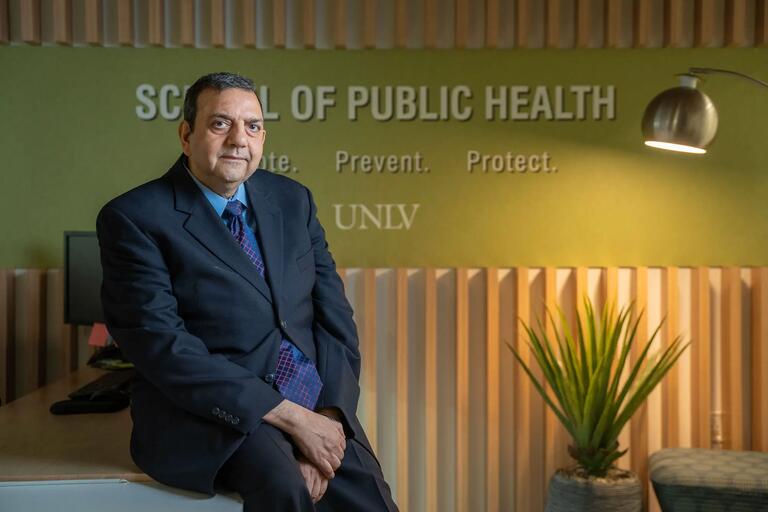Department of Social and Behavioral Health News
Housed in the UNLV School of Public Health, the Department of Social and Behavioral Health consists of faculty who engage in research and develop and evaluate community-based programs that promote health and disease prevention. Our students learn to identify high-risk behaviors or trends in specific populations, as well as propose solutions that aim to improve overall public health in communities.
Current Social and Behavioral Health News

News highlights featuring UNLV students and staff who made (refreshing) waves in the headlines.

A collection of news stories highlighting UNLV’s dedication to community and research.

The Outstanding Faculty Award winner has spent over 40 years helping us understand health behavior.

The research expert recently received a $3.5M grant to conduct a study on LGBTQIA+ caregivers of dementia patients and their experiences.

Manoj Sharma receives Community Engagement Award for his work to provide access and delivery of health care to marginalized groups.

A roundup of news stories highlighting UNLV faculty and students who made headlines locally, nationally, and globally.
Social and Behavioral Health In The News
Fatima* (name changed upon request) and Salman* are new immigrants to the United States. They have a son Idris, in fourth grade, who is having a difficult time in school. His teacher, during the parent-teacher meeting, pointed out that he has difficulty reading aloud, has slow belabored reading, is poor with spelling, and is finding it hard to learn in school.
Depression, which is characterized by sustained deep feelings of sadness and melancholy, and bipolar disorder which is marked by mood swings between extreme elation and severe depression are two distinct but serious causes of disability. Both require correct diagnosis and distinct treatments. Bipolar illness usually starts in the early 20s but on average takes 8-10 years, often longer, for a correct diagnosis. Needless to say, this delay prolongs the agony of the patient and increases the negative sequelae for the patient and their families. Depression usually starts in adulthood but can occur at any age.

By 2030, the U.S. population of LGBTQ+ adults over age 50 is expected to reach 7 million. As this community grows, the need to address housing disparities in our state becomes more evident. Elders who live in urban areas, such as Las Vegas, face significant housing challenges due to lack of affordable options, fear of discrimination, social isolation, and socioeconomic and health disparities.
A recent review published by the American College of Cardiology (ACC) compared the updated blood pressure guidelines from the European Society of Hypertension (ESH). The chief difference between the criteria for the cutoff for hypertension in the US was ≥130/80 while in Europe was ≥140/90 mmHg. The guidelines in India are also akin to the European guidelines. This has caused some confusion.
From a full-time MBBS doctor in India to a celebrated author and public health expert in American academia, Professor (Dr) Manoj Sharma's journey is remarkable. A distinguished graduate faculty member at the University of Nevada, Las Vegas, he was recently nominated by his students and received the prestigious Harry Reid Silver Slate Award 2024 for outstanding public health research.
One popular school of yoga is Kundalini yoga. However, there is a lot of mystery, myths, misperceptions, and commercialization associated with it. Here I present a scientific demystification of this system of yoga. This system of yoga begins with the seventh limb of Ashtanga yoga, that of Dhyana or meditation. The purpose of this yoga is to purify the self and make the electroencephalographic (EEG) recordings of the brain subtler while one is awake so that one attains complete harmony with the environment.
Social and Behavioral Health Experts

